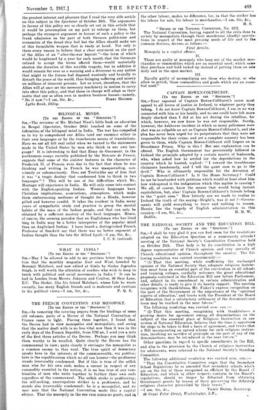BILINGUAL MINDS.
[To ran EDITOE Or THE " &LEV/TOE...1 Sea,—The reviewer of Mr. Michael West's little book on education in Bengal (Spectator, October 20th) touched on some of the infirmities of the bilingual mind in India. The war has compelled us to try to comprehend our Allies (and our enemies) either in their own languages or by the treacherous means of translations. Have we not all felt real relief when we turned to the statements made in the United States by men who think in our own lan- guage? It is interesting to find that Remy de Gourmont, in the posthumous essays recently published by the Mercure de France, suggests that some of the sinister features in the character of Frederick II. of Prussia were due to the fact that when he was thinking and writing in French he was masquerading, con- sciously or subconsciously. Does not Treitschke say of hint that it was "a tragic destiny that condemned him to think in two languages" ? This will be one of the difficulties which Mr. Montagu will experience in India. He will only come into contact with the English-speaking Indian. Western languages have Christian implications, associations, atmosphere, which make them embarrassing mediums of thought for a Hindu, however gifted and however candid. It takes the resident in India many years of sympathetic study and practice to grasp the mental habits of the mass of the Indian people, and that can only be obtained by a sufficient mastery of the local languages. Hence, of course, the seeming paradox that an Englishman who has lived long in India may be a better interpreter of the popular mind than an Anglicised Indian. I have heard a distinguished French Professor of Sanskrit say that there was no better exponent of Indian thought than the late Sir Alfred Lyall.—I am, Sir, Ac..
I. C. S. (retired).














































 Previous page
Previous page